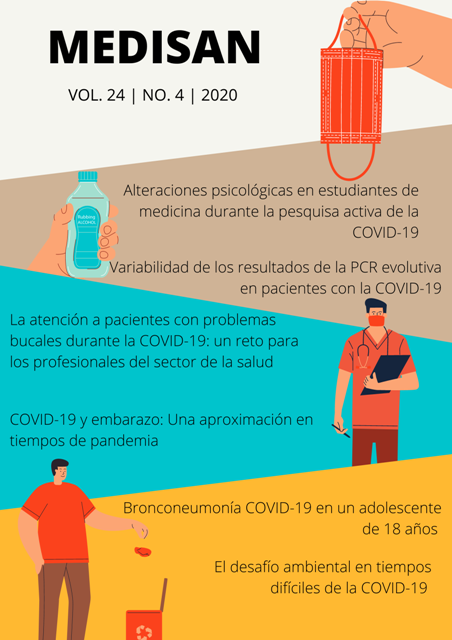La vida profesional de figuras relevantes de las ciencias médicas como incentivo en la formación de los estudiantes de Medicina
Palabras clave:
formación médica, formación profesional, personalidades de la medicina, valores humanistas.Resumen
La educación y los valores son dimensiones humanas ligadas recíprocamente. La educación constituye un bien en la medida en que facilita el desarrollo de la persona, en tanto los valores están incluidos en la educación, pues la sociedad ha apropiado los fines de esta, los cuales motivan y orientan la búsqueda inagotable de la perfección. En correspondencia con lo anterior, y sobre la base de lo teórico, en el presente artículo se buscó contribuir al perfeccionamiento ético-profesional y de los valores, en general, durante la formación inicial, continua y permanente de los estudiantes de Medicina, a partir de un enfoque educativo y del reconocimiento de los valores emergidos de figuras relevantes de las ciencias médicas, que pueden servir como incentivo en dicha formación, a fin de lograr un mejor desempeño humanista en el ejercicio profesional de los nuevos galenos.
Descargas
Citas
2. Hirsch Adler A. Elementos teóricos y empíricos acerca de la identidad profesional en el ámbito universitario. Perfiles Educativos. 2013 [citado 24/12/2019];35(140). Disponible en: http://www.scielo.org.mx/scielo.php?script=sci_arttext&pid=S0185-26982013000200005
3. Cortés P. El sentido de las historias de vida en investigaciones socio-educativas. En: Hernández F, Sancho JM, Rivas Flores JI. Historias de Vida en Educación. Biografías en Contexto. Barcelona: ESBRINA-RECERCA; 2018. p. 68-74 [citado 26/09/2019]. Disponible en: http://diposit.ub.edu/dspace/bitstream/2445/15323/7/Historias%20de%20vida%20en%20Educaci%C3%B3n.%20Biografias%20en%20contexto.pdf
4. Franco Ferrarotti. Las historias de vida como método. Convergencia. 2007 [citado 10/08/2019];14(44). Disponible en http://www.scielo.org.mx/scielo.php?script=sci_arttext&pid=S1405-14352007000200002
5. Mallimaci F, Giménez Béliveau V. Historias de vida y método biográfico. En: Vasilachis de Gialdino I. Estrategias de Investigación cualitativa. Barcelona: Gedisa; 2006 [citado 10/08/2019]. Disponible en: http://jbposgrado.org/icuali/M%E9todo%20biogr%E1fico.pdf
6. González Rey F. Un análisis psicológico de los valores: su lugar e importancia en el mundo subjetivo. En: Fabelo Corzo JR. La formación de valores en las nuevas generaciones: “Una campaña de espiritualidad y de conciencia”. La Habana: Editorial Ciencias Sociales; 1996.
7. Maya Gutiérrez LB, Díaz Serrano G, Macias Gari M. Los valores y la profesión. Acta Médica del Centro. 2010 [citado 10/08/2018];4(2). Disponible en http://www.actamedica.sld.cu/r2_10/gestion.htm
8. Gómez Padrón Enrique Ivo, Morales Suárez Ileana. Fundamentos para la evaluación cualitativa de la formación de valores en carreras de la salud. Educ Med Super. 2019 [citado 21/03/2019];23(3). Disponible en: http://www.actamedica.sld.cu/r2_10/gestion.htm
9. Bretones Peregrina E, Solé Blanch J, Alberich González N, Ros Nicolau P. Historias de vida y educación social: Una experiencia de investigación y formación. Tendencias Pedagógicas. 2014;(24):71-84.
10. Santamarina C, Marinas Herreras JM. Historias de vida e historia oral. En: Delgado JM, Gutiérrez Fernández J. Métodos y técnicas cualitativas de investigación en ciencias sociales. Madrid: Síntesis; 1995.
11. Leite Méndez AE. Historias de vida de Maestros y Maestras. La interminable construcción de las identidades: vida personal, trabajo y desarrollo personal [tesis doctoral]. Málaga: Universidad de Málaga; 2011 [citado 04/05/2019]. Disponible en: https://riuma.uma.es/xmlui/bitstream/handle/10630/4678/TDR_LEITE_MENDEZ.pdf?sequence=6
12. Fuentes González HC, Álvarez Valiente IB, Matos Hernández EC. La teoría holístico–configuracional en los procesos sociales. Revista Pedagogía Universitaria. 2004 [citado 10/09/2019];9(1). Disponible en. http://cvi.mes.edu.cu/peduniv/index.php/peduniv/article/viewFile/273/264
13. Jara Holliday O. Orientaciones teórico-prácticas para la sistematización de experiencias. San José: Centro de Estudios y Publicaciones Alforja; 2011 [citado 10/09/2019]. Disponible en: http://centroderecursos.alboan.org/ebooks/0000/0788/6_JAR_ORI.pdf
Publicado
Cómo citar
Número
Sección
Licencia
Esta revista provee acceso libre e inmediato a su contenido bajo el principio de que hacer disponible gratuitamente investigación al público, apoya aún más el intercambio de conocimiento global. Esto significa que los autores/as conservarán sus derechos de autor y garantizarán a la revista el derecho de primera publicación de su obra, el cuál estará simultáneamente sujeto a la licencia internacional Creative Commons Atribución 4.0 que permite copiar y redistribuir el material en cualquier medio o formato para cualquier propósito, incluso comercialmente, además de remezclar, transformar y construir a partir del material para cualquier propósito.





